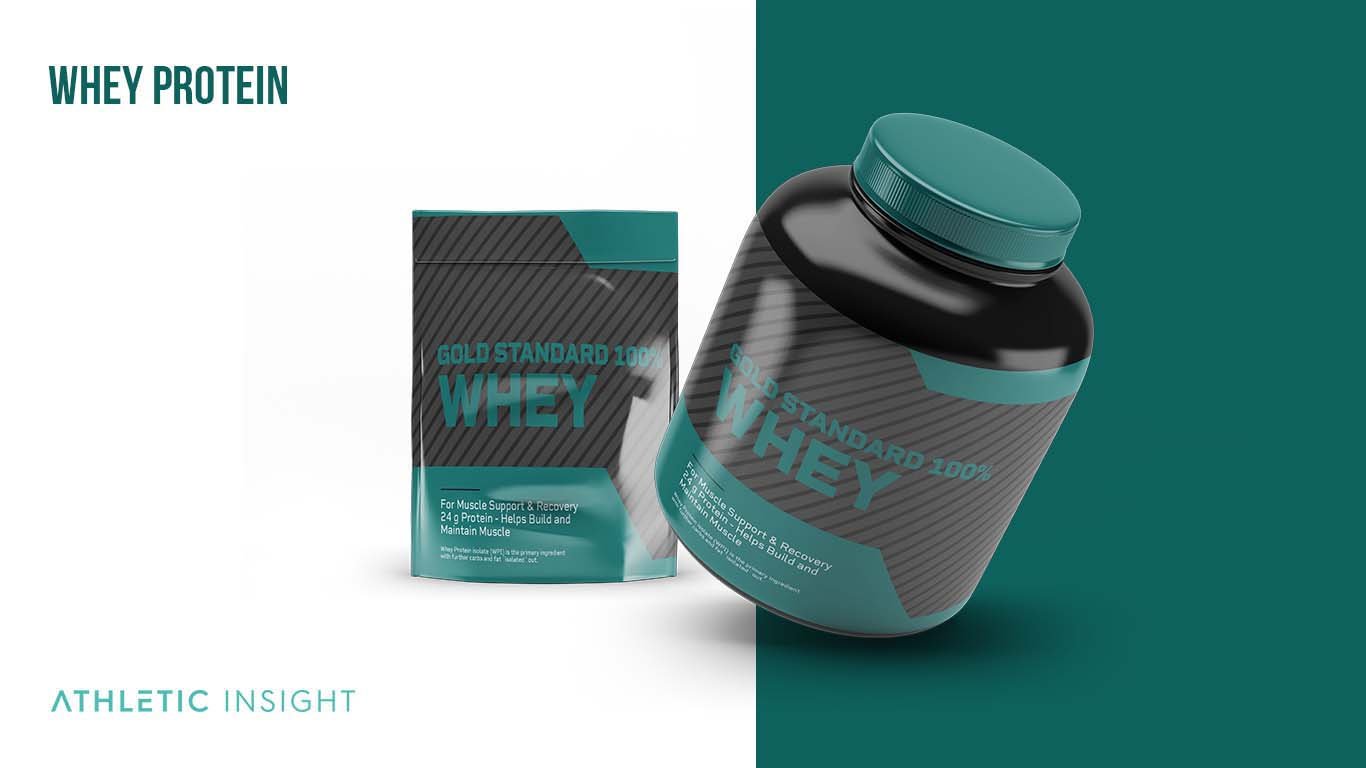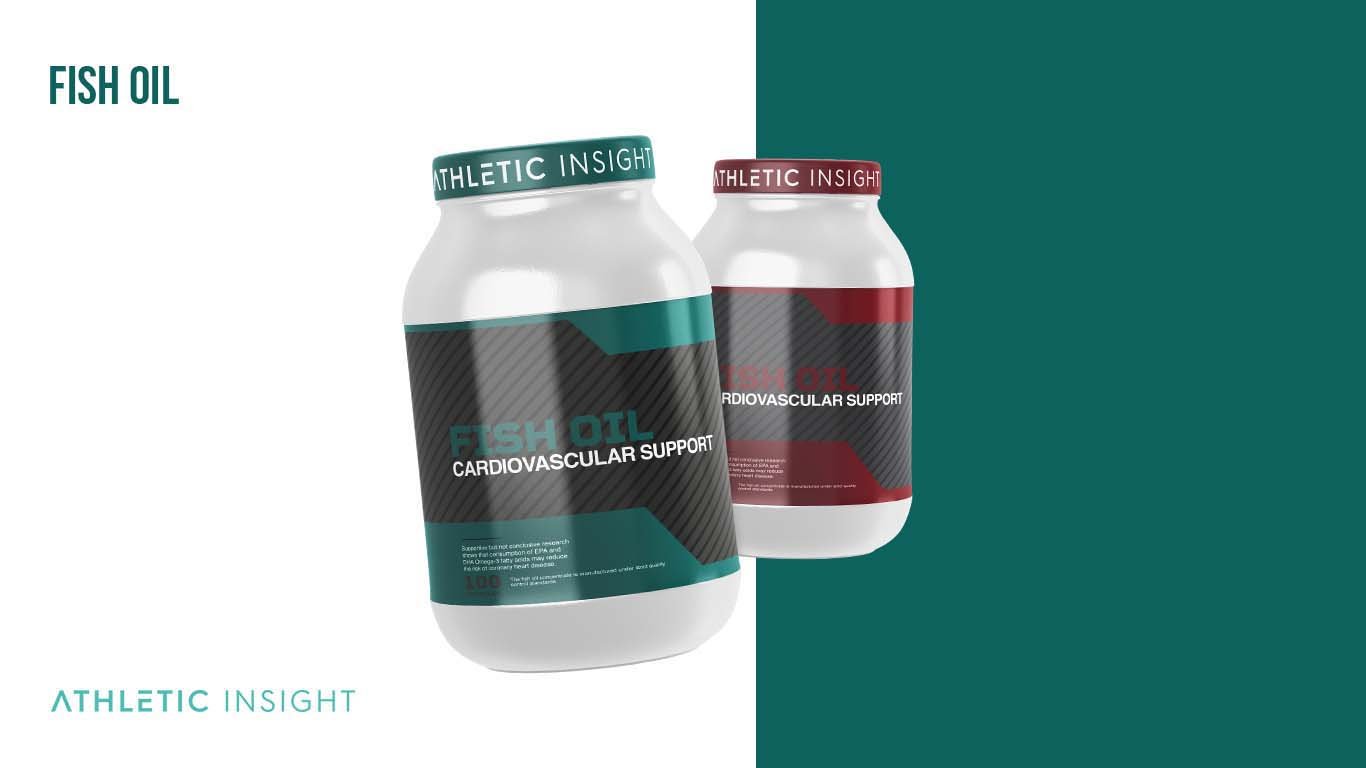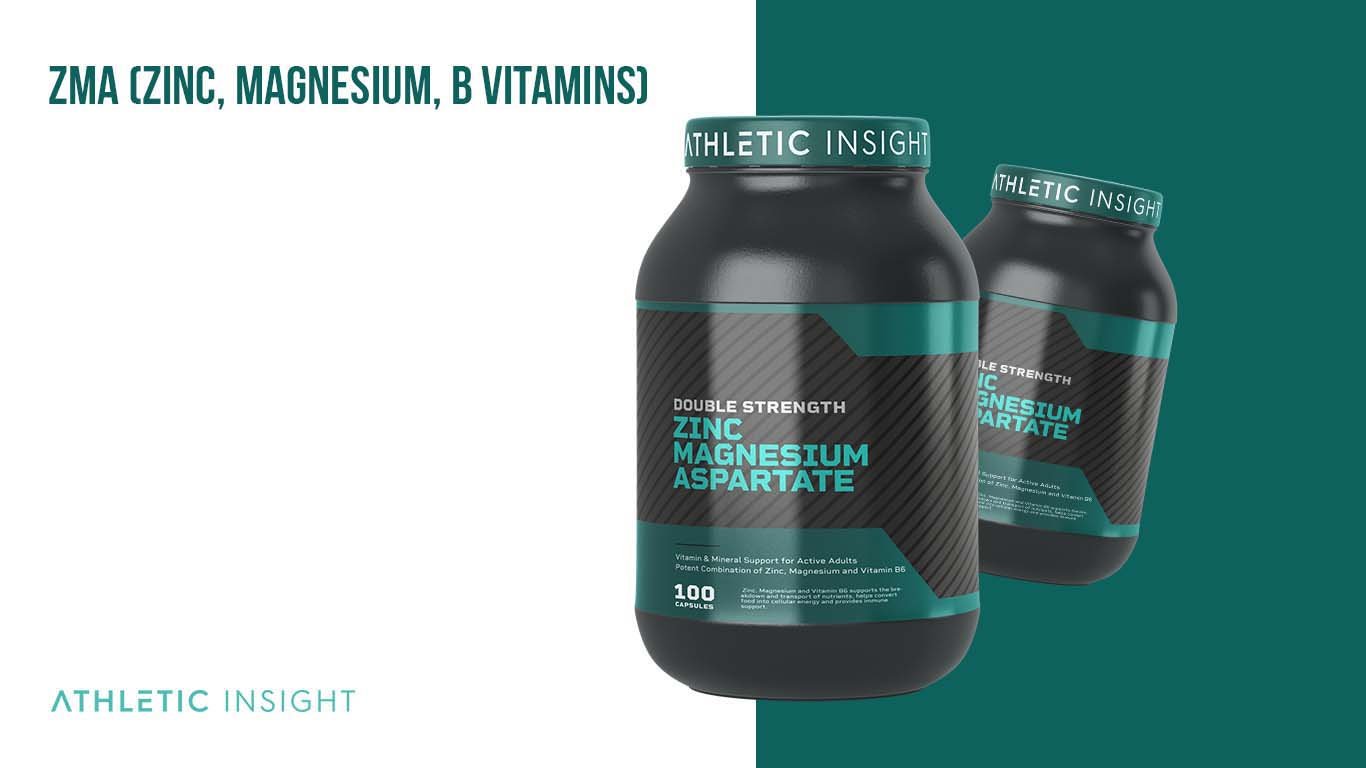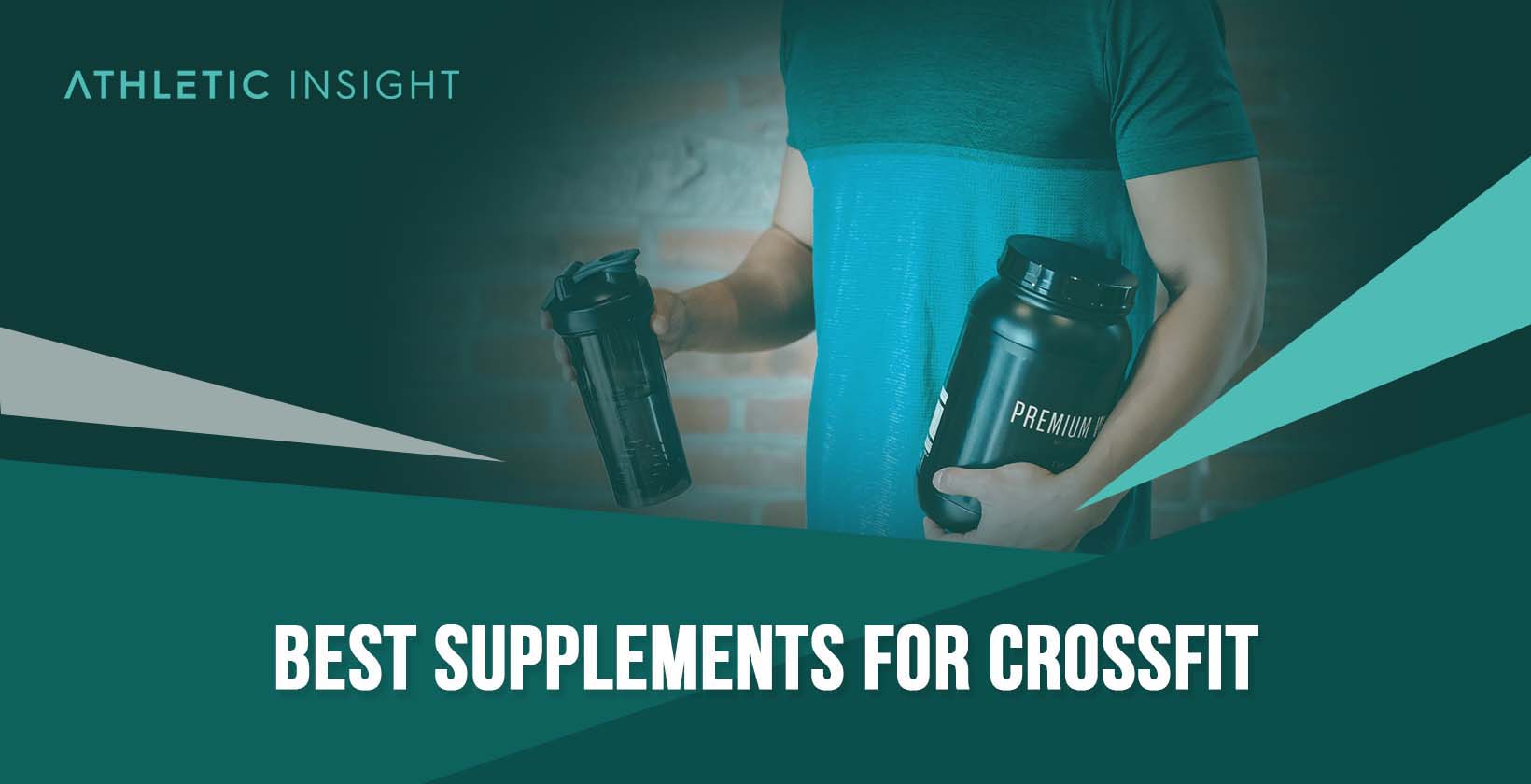CrossFit supplements enhance an athlete’s healthy lifestyle by providing the nutrients they need to maintain a nutritious diet and engage in regular, high-intensity exercise. The best supplements for CrossFit athletes have three primary purposes. They should help the athlete recover quickly, boost overall performance, and enhance endurance for daily workouts.
Athletes should look for CrossFit supplements that can increase muscle mass, support hydration and recovery, reduce inflammation and soreness, and support metabolic needs. CrossFit supplement stacks are one of the best ways to accomplish all of these things to maximize performance and recovery.
Athletic Insight Top 5 Products
- Whey Protein >>> Best Whey Protein Supplement
- Multivitamin >>> Best Multivitamin Supplement
- Creatine >>> Best Creatine Supplement
- Turmeric >>> Best Turmeric Supplement
- Fish Oil >>> Best Fish Oil Supplement
The top three supplements for CrossFit include protein, multivitamins, and creatine. Finding the right balance involves comparing different elements to determine what each provides for an athlete. While one CrossFit supplement might boost muscle building, another might support muscle recovery. Both supplements benefit the athlete and help them get back to training. Below are some of the best CrossFit Supplements.
- Whey Protein
- Multivitamin
- Creatine
- Turmeric
- Creatine Monohydrate
- Fish Oil
- BCAAs
- Citrulline Malate
- Beta-Alanine
- Protein Powder
- N-3 Fats
- Vitamin D3
- ZMA (Zinc, Magnesium, B Vitamins)
1. Whey Protein
Protein is one of the best options for supplementing CrossFit workouts because it helps rebuild the torn muscles. Athletes rely on proteins for quick recovery so that they can maintain daily, high-intensity workouts.

Athletes can easily get protein through their diets by eating lean meats, legumes, nuts, grains, seeds, and lentils. These food items can help athletes build lean muscle and shed fat.
Eating too much protein can be problematic because the body stores excess energy as fat. The excess protein can also cause abdominal discomfort from bloating and gas.
Adults require 0.8 grams of protein per pound of body weight. However, CrossFit athletes participate in regular, high-intensity exercise, meaning they should aim for one gram of protein for every pound of body weight.
The costs of getting sufficient amounts of protein can vary. Lean meats can cost as much as nine dollars per pound, while beans offer a more cost-effective solution at as little as fifty cents per can. Rehydrating dry beans can be even more efficient in terms of cost and nutrition.
Depending on your budget and requirements, the following supplement brands are the best available products on the market.
- Thorne Protein Powder (Best Overall)
- Transparent Labs Protein Powder (Top Rated)
- Crazy Nutrition Protein Powder (Best Budget Option)
2. Multivitamin
The best CrossFit recovery supplement stacks often include multivitamins. While it’s possible to get enough nutrients through their diet, CrossFit athletes can fill in any gaps in micronutrients with a single capsule once per day.
While overdoing it with vitamins shouldn’t cause too many negative side effects, taking more than prescribed doesn’t benefit the body in any way. Excess vitamins typically filter out of the body through the urine. Some vitamins can alter urine color, like turning it green when taken in excess.
Multivitamins can be costly, with some brands costing as much as $80 to $100 per month. However, there are some cost-effective options at local pharmacies and grocery stores. The following brands are some of the best multivitamins available.
- Thorne Multivitamin (Best Overall)
- BrainMD Multivitamin (Top Rated)
- Transparent Labs Multivitamin (Best Budget)
- Ora Organics Multivitamin (Best Plant-based Option)
3. Creatine Monohydrate
Creatine is vital for building muscle mass and improving overall physical performance, making it one of the most crucial amino acids for CrossFit sessions. This amino acid supports muscle repair, which expedites post-workout recovery.
The muscles store most of the body’s creatine, but it’s also found in the brain. People can ingest creatine by eating meals with seafood, red meat, dairy products, nuts, seeds, and beans. However, athletes typically require more than the average person, making a creatine supplement useful.
Always follow package instructions for serving sizes to avoid negative side effects. In excess, creatine supplements may cause digestive problems, dehydration, and muscle cramping. The following brands offer some of the best creatine supplements.
- Thorne Creatine (Budget Overall)
- Transparent Labs (Top Rated)
- Crazy Nutrition (Best Budget)
4. Turmeric
Turmeric is a spice that comes from a flowering plant native to southeast Asia. It’s similar to ginger and commonly used to make curry powder.
Many cultures have used turmeric for medicinal purposes for thousands of years because of its beneficial properties. Turmeric supports healthy digestion, aids in respiratory wellness, combats the effects of allergies, and may reduce depressive symptoms.
The recommended daily intake for adults is 1.4 milligrams of turmeric per pound of body weight. Though it’s not easy to ingest too much turmeric, long-term overuse can cause diarrhea, nausea, and even dizziness.
The versatile spice works in food and drinks, but it’s also possible to find it in pills and capsules. Turmeric powder can cost as little as $5, while pills run anywhere from a few dollars up to $20.
Athletes have dozens of options for turmeric supplements that aid in CrossFit recovery, but these are the three best products.
- Thorne Turmeric (Best Overall)
- Ora Organics (Top Rated)
- Transparent Labs (Best Budget)
5. Fish Oil
Fish oil is the oil extracted from certain fish, like tuna and mackerel. It contains omega-3 fatty acids that support important bodily functions, including cell growth. Taking fish oil can improve blood flow, reduce inflammation, improve heart health, and boost the immune system.

Though fish oil remains an effective CrossFit supplement, athletes might experience some side effects, including digestive issues, bad breath, and a strange aftertaste.
Vegans and vegetarians who don’t want to break for fish oil can get a similar effect with flaxseed oil. Athletes should take between 250 and 500 milligrams of fish oil per day.
Fish oil can be fairly inexpensive at around $5 for 100 capsules. High-content capsules can cost more, upwards of $30 for the same number of pills.
- Thorne Omega 3 Fish Oil (Best Overall)
- Ora Organics Omega 3 Fish Oil (Top Rated)
- BrainMD Omega 3 Fish Oil (Best Budget)
6. BCAAs
BCAAs are branched-chain amino acids. Amino acids are vital for building muscle, removing toxins from the blood, and repairing body parts after exercise. Additionally, BCAAs will help combat muscle soreness and tenderness after challenging CrossFit sessions.
Athletes can ingest BCAAs by eating certain foods, including beef, chicken, beans, lentils, and corn. CrossFit protein powders can ensure athletes get enough BCAAs to maintain their physically demanding lifestyle.
Always follow the instructions on the package, especially when experimenting with different BCAA supplements. Overdoing it with BCAAs can cause digestive and neurological problems. Athletes ingesting too many BCAA supplements might notice coordination issues, fatigue, bloating, and nausea.
Expect to pay a little more for BCAA supplements. The powders can run anywhere from $20 per container up to $50, and the products on the market include some of the following brands.
- Thorne BCAAs (Best Overall)
- Transparent Labs BCAAs (Top Rated)
- Crazy Nutrition BCAA (Best Budget)
7. Beta-Alanine
CrossFit enthusiasts who engage in intense exercises can benefit from adding a beta-alanine supplement into their diet. The substance can help reduce fatigue, improve endurance, and support quick recovery after a hard workout.
Note that taking too much beta-alanine can cause flushing and tingling sensations throughout the body. Also, be mindful of any additional ingredients in the beta-alanine supplements because they can trigger allergic reactions.
Athletes should take four to six grams of beta-alanine per day. It’s best to divide the doses throughout the day to take no more than two grams at a time. Additionally, it takes a few weeks to notice the effects.
Prices can range from $10 or $11 for a package up to $30 or $40. Powders can cost slightly more but typically have more servings per container than pills.
The best beta-alanine supplements based on their effect, quality, and flavor include the following brands.
- Thorne Beta-Alanine (Best Overall)
- Transparent Labs Beta-Alanine (Top Rated)
- Optimum Nutrition Beta-Alanine (Best Budget)
8. Protein Powder
Protein powder can provide the body with enough protein to repair the muscles and recover after exercise.
Most protein should come from an athlete’s diet, and athletes should not use protein powders as a substitute for healthy meals. Instead, adding a scoop or two of protein powder can help replace what’s lost during the high energy CrossFit workouts.
Taking too much protein powder can cause problems with the bones and kidneys. It can also increase the risk of developing cancer.
Prices range from $10 per container up to as much as $40. The best protein powders come in many varieties, including:
- Thorne Protein Powder (Best Overall)
- Transparent Labs Protein Powder (Top Rated)
- Crazy Nutrition Protein Powder (Best Budget Option)
- Ora Organics Protein Powder (Best Plant-based Option)
9. Citrulline Malate
Citrulline malate is an amino acid that can help improve the metabolism and boost the way it functions. This amino acid can help reduce blood pressure and increase blood flow. Citrulline malate may also help people with hypertensive symptoms, cardiovascular issues, or chronic fatigue.
Individuals who engage in intense CrossFit regimens can benefit from a citrulline malate supplement since it can battle constant fatigue and increase energy levels. However, taking too much citrulline malate can cause men to experience symptoms consistent with erectile dysfunction.
The average cost of a citrulline malate powder is around $25 for a container. Here are some of the best citrulline malate brands to consider:
- Swolverine Citrulline Malate (Best Overall Option)
- Huge Supplement Wrecked (Best Pre-Workout Option)
- Microingredients L-Citrulline Malate (Best Vegan Option)
10. N-3 Fats
N-3 fatty acids are essential components of overall health and wellness, like omega-3s and omega-6s. The human body cannot make N-3 fats on its own, so supplements can provide the vital amino acids.
Omega-3s reduce risks for cardiovascular disease, play a factor in arthritic relief, and can boost mental health.
Athletes can acquire N-3 fatty acids through fish, vegetable oils, nuts, legumes, seeds, and leafy greens. Supplements serve as concentrated sources of N-3 fatty acids to ensure athletes get what they need.
Costs vary depending on whether the athlete gets the N-3 fatty acids from foods or as supplements. These supplement brands can help reap the benefits of N-3 fatty acids.
- Nordic Naturals Ultimate Omega (High-Quality Option)
- Amazon Elements Super Omega-3 with Lemon Flavor (Budget-Friendly Option)
- Barlean’s Ideal Omega3 Softgels (Better Option for Taste)
11. Creatine Hydrochloride
Creatine Hydrochloride (HCL) is an amino acid that helps build muscle strength and provide energy boosts. It’s a combination of a creatine molecule with hydrochloride attached. The supplement’s solubility makes it especially easy to absorb, easing the strain on the digestive system.
Side effects of traditional creatine monohydrate include bloating and other digestive issues related to creatine monohydrate, so many athletes choose to use creatine hydrochloride instead.
Taking too much of any creatine supplement won’t benefit the body in any way, but it can cause digestive discomfort. The body typically sheds excess creatine through the urine, meaning it’s a waste of money to take more than advised on the product’s label.
Depending on the type of creatine, it can cost between $25 and $50 for 60 to 100 servings. Popular creatine hydrochloride supplements include:
- Muscle Tech Creatine HCl Powder (Budget-Friendly Option)
- Psycho Sloth Creatine HCl Capsules (Ease of Use)
- Con-Cret HCl Powder (Best for Micro-Dosing)
12. ZMA (Zinc, Magnesium, B Vitamins)
Zinc, magnesium, and B vitamins are essential for everyday physical and mental functioning. Although these vitamins often appear in daily multivitamins, taking extra can enhance mental functioning and boost workout recovery.

ZMA controls metabolism and ensures proper digestive functioning. The vitamin block can also improve mental clarity and combat depressive symptoms. A ZMA supplement also combats illnesses by boosting the immune system and supporting better sleep.
High amounts of zinc, magnesium, and B vitamins can cause nausea, vomiting, diarrhea, and stomach issues.
ZMA supplements are safe when taken in the correct dosage. Always follow package instructions and monitor intake of each supplement. Pricing ranges from $10 up to $30 for 60 to 100 servings. Try these top ZMA supplements:
13. Clean Carbohydrates
A clean carbohydrate supplement provides energy for the body to use during CrossFit sessions. Without sufficient carbohydrates, athletes may feel tired, experience chronic fatigue, and remain generally unhappy or even depressed.
Taking too much carbohydrate powder can be detrimental and leave athletes feeling slow. Excess carbohydrate intake can also lead to weight gain without the positive impact on muscle growth or CrossFit performance.
If athletes experience sluggishness, try reducing the carbohydrate servings by half. Here are some of the best clean carbohydrates on the market.
- Post-Jym Fast Digesting Carb (Budget-Friendly Option)
- Ryno Power Carb-Fuel (Vegetarian and Vegan-Friendly Option)
- Xwerks Motion (Tasty Option)
- MET-Rx (Best Overall Option)
- Universal Nutrition ZMA Pro (Best Broad-Spectrum Option)
- Nugenix PM ZMA with Testosterone (Best ZMA for Men)
What Are CrossFit Supplements?
CrossFit supplements are specific supplements added to a diet to help muscle recovery after intense workouts. These supplements typically support muscle growth, recovery, and repair.
The best CrossFit supplements rely heavily on proteins, but also include minerals that the body loses through sweat.
Most athletes only need additional CrossFit supplements if engaging in frequent, lengthy CrossFit sessions. However, those who sweat excessively or have a low-protein diet may need additional supplements.
How To Choose The Best Supplement for CrossFit?
The best supplement for CrossFit will depend entirely on the athlete’s lifestyle, fitness level, and diet. Someone who does CrossFit but eats plenty of protein through their normal diet may not need supplements.
Here is how to choose the best CrossFit supplements.
- Evaluate the CrossFit routine. If the workout is more cardio-heavy than weighted, a carb supplement may be better than a protein-heavy option, and vice versa.
- Determine which supplements are missing from the diet.
- Start slow and only adopt a few new supplements at a time. Give the supplements time to work before deciding what to use or exclude.
- Monitor the body’s reaction to supplements. Experiencing negative side effects after taking the supplements may suggest it’s not the right option.
It’s not always easy to know how to choose the best CrossFit supplements, so it’s always a good idea to consult a nutritionist or doctor for help.
What Is the Best CrossFit Recovery Supplement?
The best CrossFit supplement for recovery will typically be protein powder or eating a protein-heavy meal. Otherwise, creatine monohydrates and clean carbohydrates are other excellent supplements to adopt into the diet for recovery.
Protein is one of the most important supplements to help with muscle recovery after an especially challenging workout. Eating consistently high protein will lessen muscle fatigue and boost energy levels.
These are some of the best CrossFit recovery supplements.
- Vega Protein Powder (Plant-Based Option)
- Thorne Creatine (Budget-Friendly Option)
- Xwerks Motion (Tasty Option)
What Are the Benefits of CrossFit Supplements?
The benefits of CrossFit supplements are broad and include a variety of factors that can improve mental health, performance, and sleep. CrossFit supplements can make athletes feel better and recover quicker from workouts to improve faster after workouts.
CrossFit supplements may also help improve mental clarity and reduce brain fog. For example, omega-3s are amino acids the human body doesn’t produce. Athletes can only acquire them through consumption, but the amino acids remain essential for mental health and overall wellness.
Who Uses CrossFit Supplements?
Anybody can benefit from CrossFit supplements, but they are best for athletes who engage in consistent, high-intensity workouts. These supplements can also improve mental health by boosting mood and motivation levels.
Someone who does CrossFit at least four to five times a week will see the most benefits from using CrossFit supplements. Additionally, those who sweat frequently, move a lot, and work hard during a CrossFit routine probably need CrossFit supplements in their diet to maintain that level of physical exertion.
What Are the Best Protein Powder Supplements for CrossFit?
The best protein powder supplements for CrossFit will be those that don’t have any artificial ingredients or dyes. Unfortunately, many of these substances have links to cancer and hyperactivity. The best CrossFit protein powders feature whole ingredients like plant-based items or whey protein.
These protein powders are some of the best for CrossFit enthusiasts and can support faster recovery and better overall performance.
- Vega Protein Powder (Best Overall Option)
- BioSteel 100% Whey Protein Powder (Milk-Based Option)
- Bob’s Red Mill Almond Protein Powder (Clean Diet Option)
- Orgain Organic Plant-based Protein + Superfoods Powder
- Ascent Native Fuel Whey Protein
- Optimum Nutrition Gold Standard 100% Whey Protein
- NorCal Organic Pea Protein
Are CrossFit Supplements Effective?
Yes, CrossFit supplements are effective if used properly. If athletes use CrossFit supplements without proper care and attention, they may become overwhelmed, nauseous, or unhappy.
CrossFit supplements can help boost performance, develop a daily routine, and sleep better. Many CrossFit enthusiasts will see smaller recovery times, enhanced performance, and better overall emotional stability when they take CrossFit supplements.



